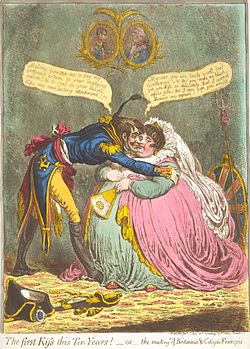Peace of Amiens
| "Definitive Treaty of Peace" | |
|---|---|

James Gillray, The first Kiss this Ten Years! —or—the meeting of Britannia & Citizen François (1803)
|
|
| Type | Peace treaty |
| Signed | 25 March 1802 |
| Location | Amiens, France |
| Effective | 25 March 1802 |
| Expiration | 18 May 1803 |
| Signatories |
Joseph Bonaparte for the French Republic Marquess Cornwallis for Britain José Nicolás de Azara for the Kingdom of Spain Rutger Jan Schimmelpenninck for the Batavian Republic |
| Language | English, French |
The Treaty of Amiens temporarily ended hostilities between the French Republic and Great Britain during the French Revolutionary Wars. It was signed in the city of Amiens on 25 March 1802 (Germinal 4, year X, in the French Revolutionary calendar), by Joseph Bonaparte and the Marquess Cornwallis as a "Definitive Treaty of Peace". The consequent Peace of Amiens lasted only one year (18 May 1803) and engendered the only period of general peace in Europe between 1793 and 1814. Under the treaty, Britain recognised the French Republic; the British parliament had dropped England's historical claim to the now-defunct French Kingdom only two years previously. Together with the Treaty of Lunéville (1801), the Treaty of Amiens marked the end of the Second Coalition, which had waged war against Revolutionary France since 1798.
The War of the Second Coalition started well for the coalition, with successes in Egypt, Italy and Germany. After France's victories at the Battles of Marengo and Hohenlinden, Austria, Russia and Naples sued for peace, with Austria eventually signing the Treaty of Lunéville. Horatio Nelson's victory at the Battle of Copenhagen on 2 April 1801 halted the creation of the League of Armed Neutrality and led to a negotiated ceasefire.
The French First Consul, Napoleon Bonaparte, first made truce proposals to British foreign secretary Lord Grenville as early as 1799. Because of the hardline stance of Grenville and Prime Minister William Pitt the Younger, their distrust of Bonaparte, and obvious defects in the proposals, they were rejected out of hand. However, Pitt resigned in February 1801 over domestic issues and was replaced by the more accommodating Henry Addington. At this point, according to Schroeder, Britain was motivated by the danger of a war with Russia.
...
Wikipedia
